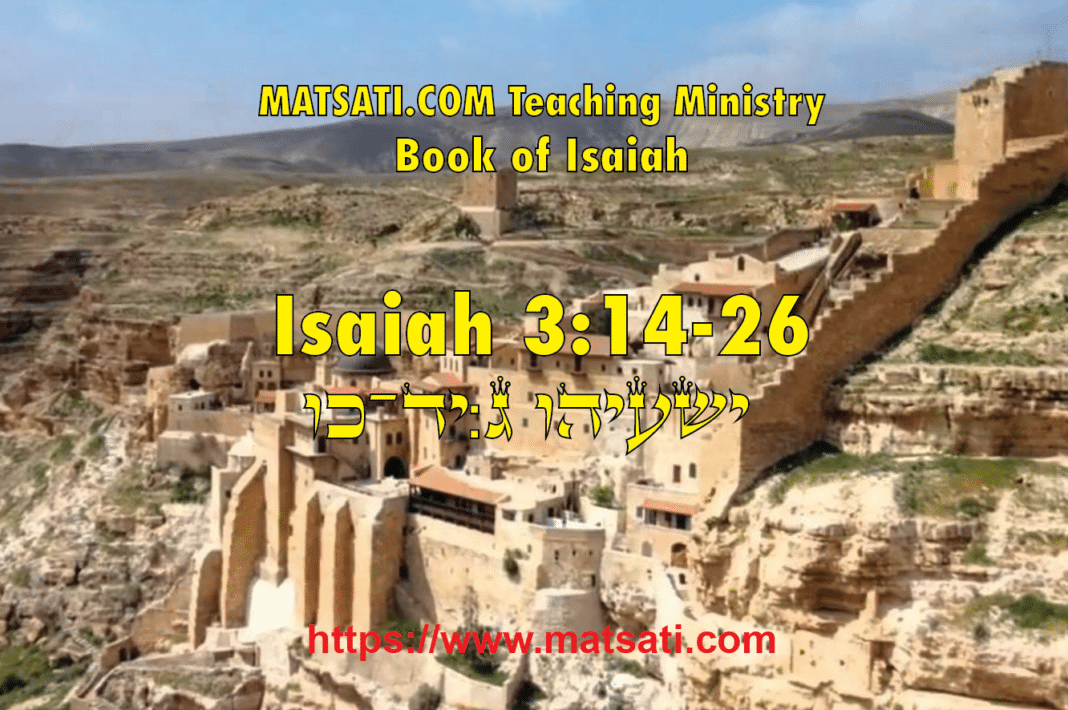Table of Contents
Introduction to Isaiah 3:14-26
The general idea of what Isaiah is saying here is on the pride of man with man wanting to glory in himself as opposed to bringing glory to the Lord God Almighty. This brings great shame when one realizes or has to admit that he or she has been reduced to begging by God Himself. This humbling is recognized as previously having lived in affluence and luxury and now being in rags and poor. This is the major theme of Isaiah chapter 3. Isaiah continues saying the following:
ספר ישעיה פרק ג
יד יְהֹוָה בְּמִשְׁפָּט יָבוֹא עִם-זִקְנֵי עַמּוֹ וְשָֹרָיו וְאַתֶּם בִּעַרְתֶּם הַכֶּרֶם גְּזֵלַת הֶעָנִי בְּבָתֵּיכֶם: טו מַלָּכֶם [מַה לָּכֶם] תְּדַכְּאוּ עַמִּי וּפְנֵי עֲנִיִּים תִּטְחָנוּ נְאֻם-אֲדֹנָי יְהֶֹוִה צְבָאוֹת:
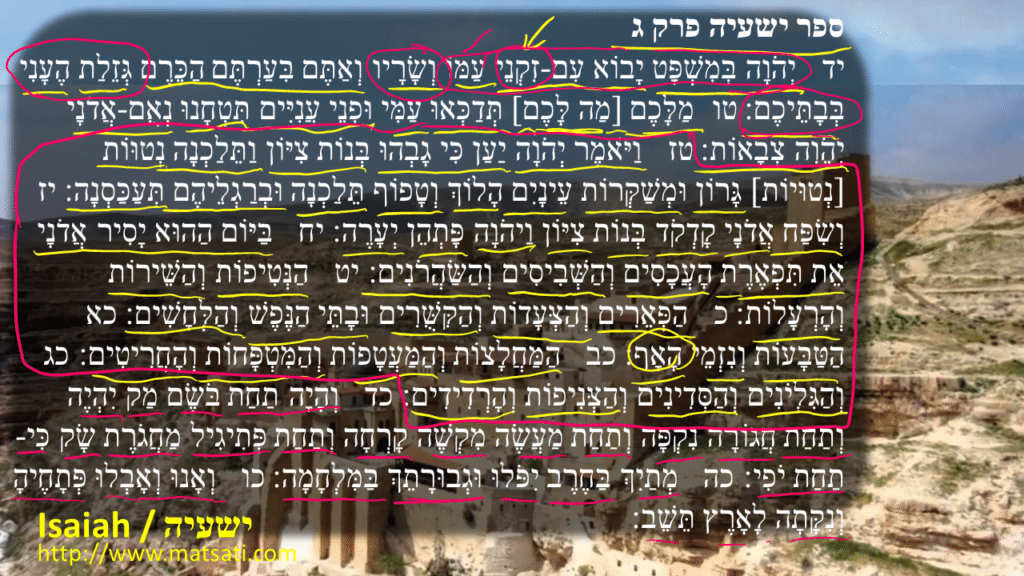
Isaiah 3:14 states “The LORD will enter into judgment with the ancients of his people, (יְהֹוָה בְּמִשְׁפָּט יָבוֹא עִם-זִקְנֵי עַמּוֹ) and the princes thereof: (וְשָֹרָיו) for ye have eaten up the vineyard; (בִּעַרְתֶּם הַכֶּרֶם) the spoil of the poor is in your houses. (גְּזֵלַת הֶעָנִי בְּבָתֵּיכֶם)” Isaiah 3:15 “What mean ye that ye beat my people to pieces, (מַלָּכֶם [מַה לָּכֶם] תְּדַכְּאוּ עַמִּ) and grind the faces of the poor? (וּפְנֵי עֲנִיִּים תִּטְחָנוּ) saith the Lord GOD of hosts. (נְאֻם-אֲדֹנָי יְהֶֹוִה צְבָאוֹת)” Isaiah says יְהֹוָה בְּמִשְׁפָּט יָבוֹא עִם-זִקְנֵי עַמּוֹ “The LORD will enter into judgment with the ancients of his people.” Here the word זִקְנֵי is written in the construct form and translated by the KJV as “the ancients.” Looking elsewhere, this word is used 62 times in the construct form in the Hebrew bible. A couple places are listed below:
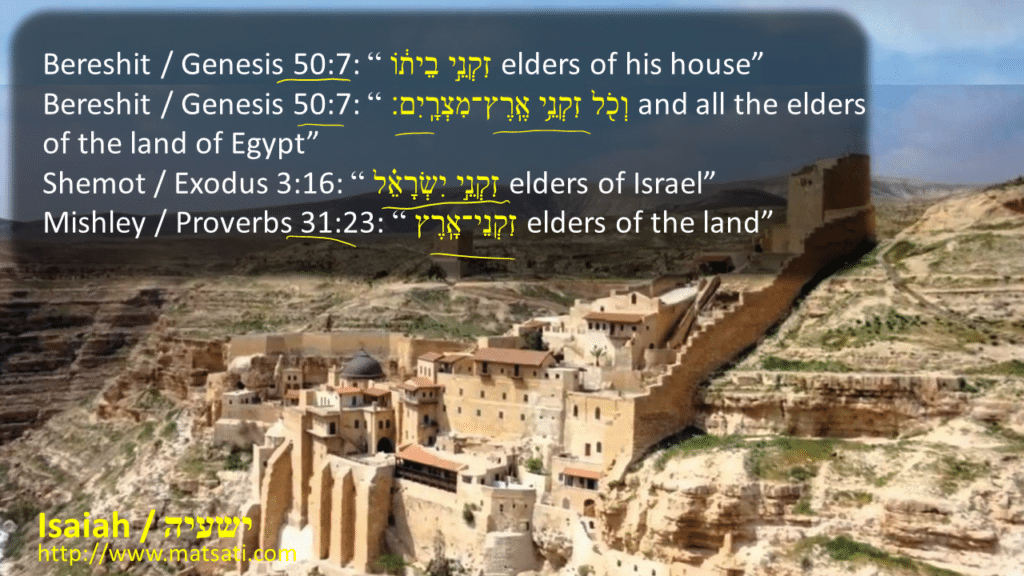
Bereshit / Genesis 50:7: זִקְנֵ֣י בֵית֔וֹ “elders of his house”
Bereshit / Genesis 50:7: וְכֹ֖ל זִקְנֵ֥י אֶֽרֶץ־מִצְרָֽיִם׃ “and all the elders of the land of Egypt”
Shemot / Exodus 3:16: זִקְנֵ֣י יִשְׂרָאֵ֗ל “elders of Israel”
Mishley / Proverbs 31:23: זִקְנֵי־אָֽרֶץ “elders of the land”
We note that the word זִקְנֵי is better translated as “elders” as opposed to “ancients.” The elders are an obvious link to the leaders and the reason Isaiah says יְהֹוָה בְּמִשְׁפָּט יָבוֹא עִם-זִקְנֵי עַמּוֹ where the unfaithful ways of the leaders will not go unnoticed and so brings judgment (בְּמִשְׁפָּט). Here the Lord is calling the leaders to account. Important to note is when Isaiah says, גְּזֵלַת הֶעָנִי בְּבָתֵּיכֶם “the spoil of the poor is in your houses.” This suggests that these leaders have achieved their wealth through corruption and stealing from the poor. When a person enters into a place of authority, he or she has a great responsibility before God to take care of the people and not treat them badly. This is exactly what happens when Isaiah says מַלָּכֶם תְּדַכְּאוּ עַמִּ “What mean ye that ye beat my people to pieces” וּפְנֵי עֲנִיִּים תִּטְחָנוּ “and grind the faces of the poor?” The point is that leaders are to build up the people, to enable prosperity and not cause people to fall into poverty and loss. We note how in the modern parallel, unchecked spending and taxation is burdening the people significantly, causing the cost of living (food and housing) to rise significantly. Corruption of leadership is timeless because these problems that we all deal with are timeless as well! Notice something that is going on in biblical history, Zechariah lived 520 BC, just after Israel returned to Jerusalem from their first expulsion into Babylon, but while they were being ruled by the Persians. Zechariah states the following:
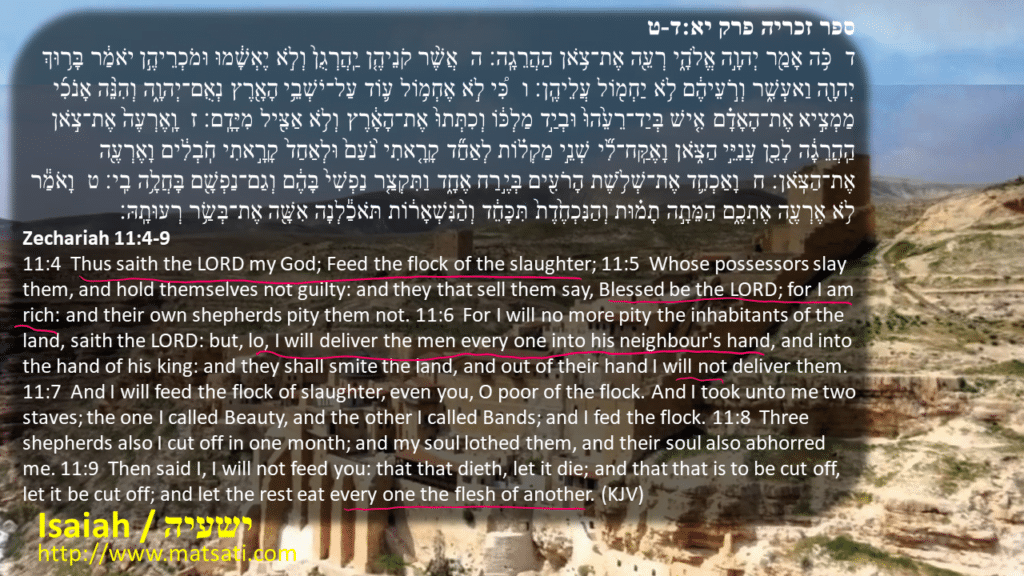
ספר זכריה פרק יא:ד-ט
ד כֹּ֥ה אָמַ֖ר יְהוָ֣ה אֱלֹהָ֑י רְעֵ֖ה אֶת־צֹ֥אן הַהֲרֵגָֽה׃ ה אֲשֶׁ֨ר קֹנֵיהֶ֤ן יַֽהֲרְגֻן֙ וְלֹ֣א יֶאְשָׁ֔מוּ וּמֹכְרֵיהֶ֣ן יֹאמַ֔ר בָּר֥וּךְ יְהוָ֖ה וַאעְשִׁ֑ר וְרֹ֣עֵיהֶ֔ם לֹ֥א יַחְמ֖וֹל עֲלֵיהֶֽן׃ ו כִּ֠י לֹ֣א אֶחְמ֥וֹל ע֛וֹד עַל־יֹשְׁבֵ֥י הָאָ֖רֶץ נְאֻם־יְהוָ֑ה וְהִנֵּ֨ה אָנֹכִ֜י מַמְצִ֣יא אֶת־הָאָדָ֗ם אִ֤ישׁ בְּיַד־רֵעֵ֙הוּ֙ וּבְיַ֣ד מַלְכּ֔וֹ וְכִתְּתוּ֙ אֶת־הָאָ֔רֶץ וְלֹ֥א אַצִּ֖יל מִיָּדָֽם׃ ז וָֽאֶרְעֶה֙ אֶת־צֹ֣אן הַֽהֲרֵגָ֔ה לָכֵ֖ן עֲנִיֵּ֣י הַצֹּ֑אן וָאֶקַּֽח־לִ֞י שְׁנֵ֣י מַקְל֗וֹת לְאַחַ֞ד קָרָ֤אתִי נֹ֙עַם֙ וּלְאַחַד֙ קָרָ֣אתִי חֹֽבְלִ֔ים וָאֶרְעֶ֖ה אֶת־הַצֹּֽאן׃ ח וָאַכְחִ֛ד אֶת־שְׁלֹ֥שֶׁת הָרֹעִ֖ים בְּיֶ֣רַח אֶחָ֑ד וַתִּקְצַ֤ר נַפְשִׁי֙ בָּהֶ֔ם וְגַם־נַפְשָׁ֖ם בָּחֲלָ֥ה בִֽי׃ ט וָאֹמַ֕ר לֹ֥א אֶרְעֶ֖ה אֶתְכֶ֑ם הַמֵּתָ֣ה תָמ֗וּת וְהַנִּכְחֶ֙דֶת֙ תִּכָּחֵ֔ד וְהַ֨נִּשְׁאָר֔וֹת תֹּאכַ֕לְנָה אִשָּׁ֖ה אֶת־בְּשַׂ֥ר רְעוּתָֽהּ׃
Zechariah 11:4-9
11:4 Thus saith the LORD my God; Feed the flock of the slaughter; 11:5 Whose possessors slay them, and hold themselves not guilty: and they that sell them say, Blessed be the LORD; for I am rich: and their own shepherds pity them not. 11:6 For I will no more pity the inhabitants of the land, saith the LORD: but, lo, I will deliver the men every one into his neighbour’s hand, and into the hand of his king: and they shall smite the land, and out of their hand I will not deliver them. 11:7 And I will feed the flock of slaughter, even you, O poor of the flock. And I took unto me two staves; the one I called Beauty, and the other I called Bands; and I fed the flock. 11:8 Three shepherds also I cut off in one month; and my soul lothed them, and their soul also abhorred me. 11:9 Then said I, I will not feed you: that that dieth, let it die; and that that is to be cut off, let it be cut off; and let the rest eat every one the flesh of another. (KJV)
It is interesting how the very same thing is taking place, time and destruction has not changed the behavior of the leaders. Zechariah shows a similar interpretation of the leadership being interpreted as shepherds who slaughter the flock, and the leaders do not pity the people. This is how the Lord is determined to judge the leaders saying, יְהֹוָה בְּמִשְׁפָּט יָבוֹא עִם-זִקְנֵי עַמּוֹ “The LORD will enter into judgment with the ancients of his people.” This behavior of man appears to be timeless as we are seeing the very same behaviors today in our modern time. The leaders do not hear the cries of their people. They continue with restrictions, mandates, and draconian control tactics because they love power and do not abide by their own rules. “Rules for thee but not for me…” kind of mentality! This reminds us of what is written according to Tehillim / Psalms 82:1-8.
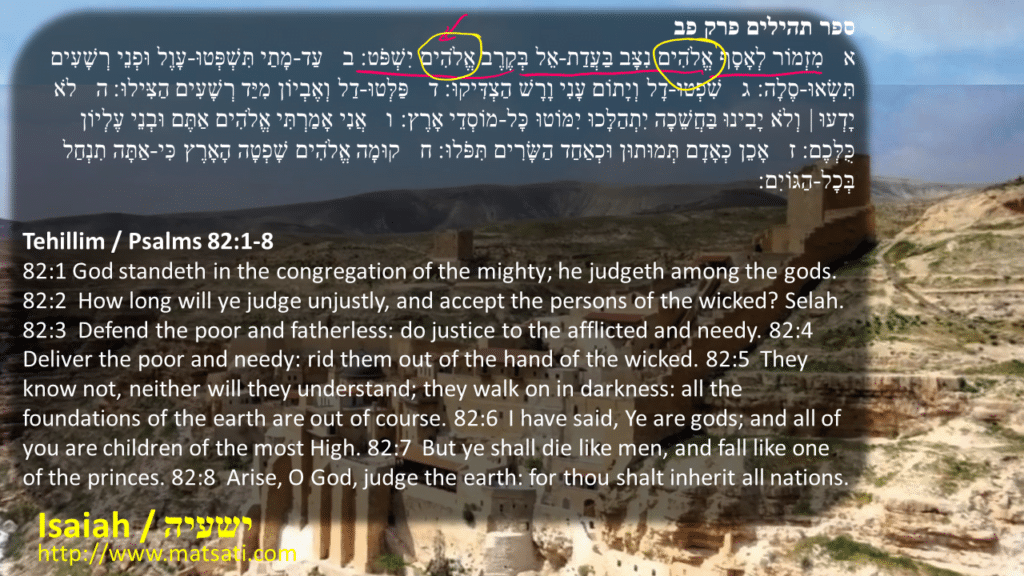
ספר תהילים פרק פב
א מִזְמוֹר לְאָסָף אֱלֹהִים נִצָּב בַּעֲדַת-אֵל בְּקֶרֶב אֱלֹהִים יִשְׁפֹּט: ב עַד-מָתַי תִּשְׁפְּטוּ-עָוֶל וּפְנֵי רְשָׁעִים תִּשְֹאוּ-סֶלָה: ג שִׁפְטוּ-דָל וְיָתוֹם עָנִי וָרָשׁ הַצְדִּיקוּ: ד פַּלְּטוּ-דַל וְאֶבְיוֹן מִיַּד רְשָׁעִים הַצִּילוּ: ה לֹא יָדְעוּ | וְלֹא יָבִינוּ בַּחֲשֵׁכָה יִתְהַלָּכוּ יִמּוֹטוּ כָּל-מוֹסְדֵי אָרֶץ: ו אֲנִי אָמַרְתִּי אֱלֹהִים אַתֶּם וּבְנֵי עֶלְיוֹן כֻּלְּכֶם: ז אָכֵן כְּאָדָם תְּמוּתוּן וּכְאַחַד הַשָּׂרִים תִּפֹּלוּ: ח קוּמָה אֱלֹהִים שָׁפְטָה הָאָרֶץ כִּי-אַתָּה תִנְחַל בְּכָל-הַגּוֹיִם:
Tehillim / Psalms 82:1-8
82:1 God standeth in the congregation of the mighty; he judgeth among the gods. 82:2 How long will ye judge unjustly, and accept the persons of the wicked? Selah. 82:3 Defend the poor and fatherless: do justice to the afflicted and needy. 82:4 Deliver the poor and needy: rid them out of the hand of the wicked. 82:5 They know not, neither will they understand; they walk on in darkness: all the foundations of the earth are out of course. 82:6 I have said, Ye are gods; and all of you are children of the most High. 82:7 But ye shall die like men, and fall like one of the princes. 82:8 Arise, O God, judge the earth: for thou shalt inherit all nations.
We note how the psalm speaks of the wicked who commit acts of evil and there doesn’t appear to be justice. This is why the psalmist is crying out to God about justice and judging among the leaders. Something needs to be understood, the Psalm opens saying, א מִזְמוֹר לְאָסָף אֱלֹהִים נִצָּב בַּעֲדַת-אֵל בְּקֶרֶב אֱלֹהִים יִשְׁפֹּט this verse speaks of God judging among the gods according to the KJV and based upon what the Hebrew bible has written. The question is concerning the word אֱלֹהִים which is translated in the KJV as gods. We note that in the Torah, the rabbis namely Rashi, Ibn Ezra, and the Mishnah Berakhot 6a, and the Targum Onkelos, write concerning Shemot / Exodus 21:6 and the Midrash on Tehillim 82, all translate אֱלֹהִים (Elohim) as referring to judges. In Shemot / Exodus 22:28 (note 22:27 in Masoretic Text), we find a Hebrew parallelism which states, אֱלֹהִ֖ים לֹ֣א תְקַלֵּ֑ל וְנָשִׂ֥יא בְעַמְּךָ֖ לֹ֥א תָאֹֽר׃ “You are not to revile gods (אֱלֹהִ֖ים), nor curse the ruler of your people.” Onkelos states, דַיָינָא לָא תַקִיל וְרַבָא בְעַמָך לָא תְלוּט׃ “judges (דַיָינָא) “you are not to treat lightly, and teacher of your people not to curse” translating אֱלֹהִ֖ים as דַיָינָא “judges.” Notice something here, Moshe can’t be giving us a command to not curse foreign gods. The Aramaic Translation makes this clear! In addition, if we consider Hebrew parallelism, because the second clause (וְנָשִׂ֥יא בְעַמְּךָ֖ לֹ֥א תָאֹֽר) refers to the chief or leader (וְנָשִׂ֥יא) of the people, the first clause should also refer to a human being (a judge). Reading the Septuagint, the translators also agree saying the following in Shemot / Exodus 21:6, προσάξει αὐτὸν ὁ κύριος αὐτοῦ πρὸς τὸ κριτήριον τοῦ θεοῦ, καὶ τότε προσάξει αὐτὸν ἐπὶ τὴν θύραν ἐπὶ τὸν σταθμόν, καὶ τρυπήσει ὁ κύριος αὐτοῦ τὸ οὖς τῷ ὀπητίῳ, καὶ δουλεύσει αὐτῷ εἰς τὸν αἰῶνα. “shall lead him then his master to the judgment seat of God, and then lead him to the door, unto the doorpost, and shall make a hole in his master the ear with the shoemaker’s awl, and he shall serve him into the eon.” And Shemot / Exodus 22:28, Θεοὺς οὐ κακολογήσεις, καὶ ἄρχοντας τοῦ λαοῦ σου οὐ κακῶς ἐρεῖς “magistrates you shall not speak evil of, and rulers of your people you should not speak wickedly.” The questions surround the meaning of the word אֱלֹהִ֣ים, are brought into a little more clarity using the the Targum Onkelos and the LXX where אֱלֹהִ֣ים refers to human judges. The man who takes the position of leadership is responsible before God. Here Isaiah is speaking of the leadership who devours the innocent, the Lord will stand against these leaders. The reason this is so significant is by what we read throughout the Tanakh, God says that His people are His heritage.
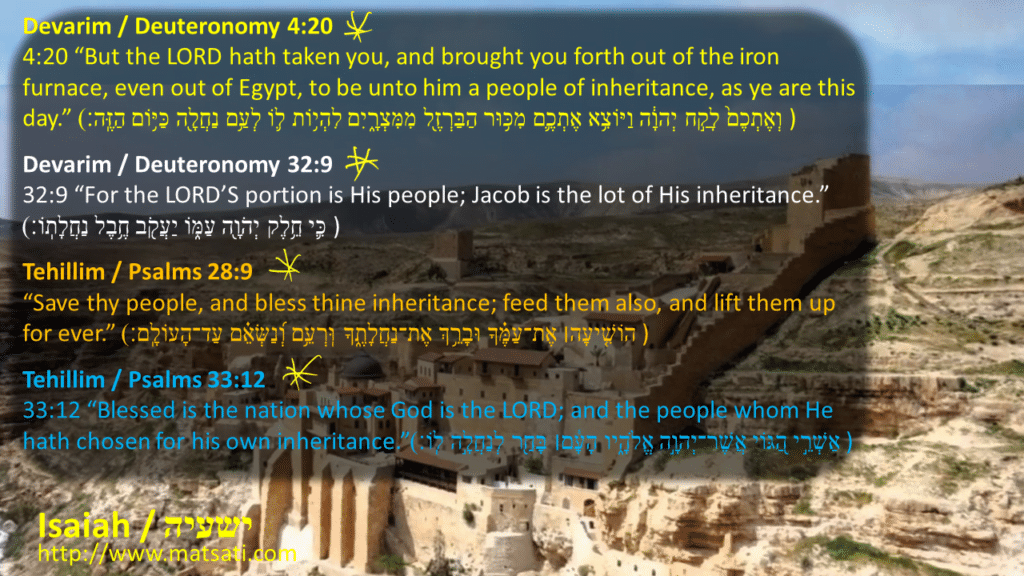
Devarim / Deuteronomy 4:20
4:20 “But the LORD hath taken you, and brought you forth out of the iron furnace, even out of Egypt, to be unto him a people of inheritance, as ye are this day.” (וְאֶתְכֶם֙ לָקַ֣ח יְהוָ֔ה וַיּוֹצִ֥א אֶתְכֶ֛ם מִכּ֥וּר הַבַּרְזֶ֖ל מִמִּצְרָ֑יִם לִהְי֥וֹת ל֛וֹ לְעַ֥ם נַחֲלָ֖ה כַּיּ֥וֹם הַזֶּֽה׃)
Devarim / Deuteronomy 32:9
32:9 “For the LORD’S portion is His people; Jacob is the lot of His inheritance.” (כִּ֛י חֵ֥לֶק יְהֹוָ֖ה עַמּ֑וֹ יַעֲקֹ֖ב חֶ֥בֶל נַחֲלָתֽוֹ׃)
Tehillim / Psalms 28:9
“Save thy people, and bless thine inheritance; feed them also, and lift them up for ever.” (הוֹשִׁ֤יעָה׀ אֶת־עַמֶּ֗ךָ וּבָרֵ֥ךְ אֶת־נַחֲלָתֶ֑ךָ וּֽרְעֵ֥ם וְ֝נַשְּׂאֵ֗ם עַד־הָעוֹלָֽם׃)
Tehillim / Psalms 33:12
33:12 “Blessed is the nation whose God is the LORD; and the people whom He hath chosen for his own inheritance.” (אַשְׁרֵ֣י הַ֭גּוֹי אֲשֶׁר־יְהוָ֣ה אֱלֹהָ֑יו הָעָ֓ם׀ בָּחַ֖ר לְנַחֲלָ֣ה לֽוֹ׃)
The scriptures clearly indicate how men, women, and children are His inheritance (נַחֲלָ֖ה). This is why the psalmist cries out for justice and for the Lord to stand among His people to bring justice to His inheritance. God’s people are expected to live according to the standard of the Scriptures!
ספר ישעיה פרק ג
טז וַיֹּאמֶר יְהֹוָה יַעַן כִּי גָבְהוּ בְּנוֹת צִיּוֹן וַתֵּלַכְנָה נְטוּוֹת [נְטוּיוֹת] גָּרוֹן וּמְשַׁקְּרוֹת עֵינָיִם הָלוֹךְ וְטָפוֹף תֵּלַכְנָה וּבְרַגְלֵיהֶם תְּעַכַּסְנָה:
Isaiah 3:16 states, “Moreover the LORD saith, (וַיֹּאמֶר יְהֹוָה) Because the daughters of Zion are haughty, (יַעַן כִּי גָבְהוּ בְּנוֹת צִיּוֹן) and walk with stretched forth necks and wanton eyes, (וַתֵּלַכְנָה נְטוּוֹת [נְטוּיוֹת] גָּרוֹן וּמְשַׁקְּרוֹת עֵינָיִם) walking and mincing as they go, and making a tinkling with their feet. (הָלוֹךְ וְטָפוֹף תֵּלַכְנָה וּבְרַגְלֵיהֶם)” Here, we are told the women are proud as well, with their own self exaltation, having wanton eyes and out stretched necks. The idea of mincing as they go and the tinkling ankle bracelets sounds like their pride is in their outward appearances.
ספר ישעיה פרק ג
יז וְשִֹפַּח אֲדֹנָי קָדְקֹד בְּנוֹת צִיּוֹן וַיהֹוָה פָּתְהֵן יְעָרֶה: יח בַּיּוֹם הַהוּא יָסִיר אֲדֹנָי אֵת תִּפְאֶרֶת הָעֲכָסִים וְהַשְּׁבִיסִים וְהַשַּׂהֲרֹנִים: יט הַנְּטִיפוֹת וְהַשֵּׁירוֹת וְהָרְעָלוֹת: כ הַפְּאֵרִים וְהַצְּעָדוֹת וְהַקִּשֻּׁרִים וּבָתֵּי הַנֶּפֶשׁ וְהַלְּחָשִׁים: כא הַטַּבָּעוֹת וְנִזְמֵי הָאָף: כב הַמַּחֲלָצוֹת וְהַמַּעֲטָפוֹת וְהַמִּטְפָּחוֹת וְהָחֲרִיטִים: כג וְהַגִּלְיֹנִים וְהַסְּדִינִים וְהַצְּנִיפוֹת וְהָרְדִידִים:
Isaiah 3:17 states, “Therefore the LORD will smite with a scab the crown of the head of the daughters of Zion, (וְשִֹפַּח אֲדֹנָי קָדְקֹד בְּנוֹת צִיּוֹן) and the LORD will discover their secret parts. (וַיהֹוָה פָּתְהֵן יְעָרֶה)” Isaiah 3:18 “In that day the Lord will take away (בַּיּוֹם הַהוּא יָסִיר אֲדֹנָי) the bravery of their tinkling ornaments about their feet, and their cauls, and their round tires like the moon, (אֵת תִּפְאֶרֶת הָעֲכָסִים וְהַשְּׁבִיסִים וְהַשַּׂהֲרֹנִים)” Isaiah 3:19 “The chains, (הַנְּטִיפוֹת) and the bracelets, (וְהַשֵּׁירוֹת) and the mufflers, (וְהָרְעָלוֹת)” Isaiah 3:20 “The bonnets, (הַפְּאֵרִים) and the ornaments of the legs, (וְהַצְּעָדוֹת) and the headbands, (וְהַקִּשֻּׁרִים) and the tablets, (הַנֶּפֶשׁ) and the earrings, (וְהַלְּחָשִׁים)” Isaiah 3:21 “The rings, (הַטַּבָּעוֹת) and nose jewels, (וְנִזְמֵי הָאָף)” Isaiah 3:22 “The changeable suits of apparel, (הַמַּחֲלָצוֹת) and the mantles, (וְהַמַּעֲטָפוֹת) and the wimples, (וְהַמִּטְפָּחוֹת) and the crisping pins, (וְהָחֲרִיטִים)” Isaiah 3:23 “The glasses, (וְהַגִּלְיֹנִים) and the fine linen, (וְהַסְּדִינִים) and the hoods, (וְהַצְּנִיפוֹת) and the vails. (וְהָרְדִידִים)” Here Isaiah goes on at great length describing the pride of women. There are different types of pride in the bible, one is the kind that one has in appreciation of God’s promises and what he has done in our lives. David speaks of this according to Tehillim / Psalms 34:1-7 in God’s protection and faithfulness to him to answer his prayers and provide for his needs. Paul describes this saying in Galatians 6:14 saying, “May I never boast except in the cross of our Lord Jesus Christ.” He also said according to Philippians 2:16, “as you hold firmly to the word of life. And then I will be able to boast on the day of Christ that I did not run or labor in vain.” Here boasting according to Paul, if it is not done to bring glory to God, it is done in vain. Sinful pride is described according to the Torah in the sense of Bereshit / Genesis 3:5 which states, “For God knows that when you eat of it your eyes will be opened, and you will be like God, knowing good and evil.” Here the evil one speaks to Eve about acquiring knowledge, and puts it into her mind what it would be like to be like God knowing good and evil. Pride from the sense of the creation account was the desire to be like God. Pride however causes one to focus more upon one’s self as opposed to caring for the needs of others, and loving God. Pride causes selfish desire and wantonness to trust in material possessions for a sense of security as opposed to trusting in God! What Isaiah is describing is men and women crediting to themselves their accomplishments as opposed to the Lord God giving them the ability to do these things. (see Devarim / Deuteronomy 8:18) Pride is disobedience to the Primary command according to the Shema, to listen and to love God with all of our heart, soul, and strength. In Isaiah 2 the prophet gives three different warnings in the same chapter about pride and how the people will be humbled on the day of the Lord. This is how the prophet describes, as “all the idols will totally disappear.” Pride is a form of idolatry in and of itself consisting of material things, worldly accomplishments, unhealthy dependence upon one’s own wealth, or admiration of one’s self or of others. All of these things will be stripped away! Every man, woman, and child will stand humbled before God!
ספר ישעיה פרק ג
כד וְהָיָה תַחַת בֹּשֶֹם מַק יִהְיֶה וְתַחַת חֲגוֹרָה נִקְפָּה וְתַחַת מַעֲשֶֹה מִקְשֶׁה קָרְחָה וְתַחַת פְּתִיגִיל מַחֲגֹרֶת שָֹק כִּי-תַחַת יֹפִי: כה מְתַיִךְ בַּחֶרֶב יִפֹּלוּ וּגְבוּרָתֵךְ בַּמִּלְחָמָה: כו וְאָנוּ וְאָבְלוּ פְּתָחֶיהָ וְנִקָּתָה לָאָרֶץ תֵּשֵׁב:
Isaiah 3:24 states, “And it shall come to pass, that instead of sweet smell there shall be stink; (וְהָיָה תַחַת בֹּשֶֹם מַק יִהְיֶה) and instead of a girdle a rent; (וְתַחַת חֲגוֹרָה נִקְפָּה) and instead of well set hair baldness; (וְתַחַת מַעֲשֶֹה מִקְשֶׁה קָרְחָה) and instead of a stomacher a girding of sackcloth; (וְתַחַת פְּתִיגִיל מַחֲגֹרֶת שָֹק) and burning instead of beauty. (כִּי-תַחַת יֹפִי)” Isaiah 3:25 “Thy men shall fall by the sword, (מְתַיִךְ בַּחֶרֶב יִפֹּלוּ) and thy mighty in the war. (וּגְבוּרָתֵךְ בַּמִּלְחָמָה)” Isaiah 3:26 “And her gates shall lament and mourn; (וְאָנוּ וְאָבְלוּ פְּתָחֶיהָ) and she being desolate shall sit upon the ground. (וְנִקָּתָה לָאָרֶץ תֵּשֵׁב)” Note the condition of man and woman, pride will lead to a fall, and the Lord is the one who will strip away personal glory. Isaiah establishes the things that will be stripped away which consists of all of the amenities of human glory. Note how Jerusalem is described as a destitute woman where she is stripped and left empty. This is a picture of disgrace, abandoning, and dejected, sitting in shame. This is the purpose of Isaiah saying וְתַחַת מַעֲשֶֹה מִקְשֶׁה קָרְחָה “and instead of well-set hair, baldness” as for a woman, baldness is one of the highest shame or embarrassment, as a woman’s hair is her glory. (1 Corinthians 11:15) This is how we will be if we stop trusting in the Lord and begin trusting in ourselves, or the things that we have! This is one of the reasons why Paul wrote the way that he did according to the Apostolic Writings. God’s mercy is patient to wait upon us to repent, just as God is giving Israel (Judah and Jerusalem) the opportunity to perform Teshuvah, and turn from their wicked ways. We have such great wealth, blessing, and promise, in the Messiah Yeshua, because of the great mercy of God our Father in heaven! The wonderful God we serve waits patiently for us to turn to Him. Isaiah’s point is that He will only wait so long, but great and abounding is his love if His people were to only repent!
Rabbinic Literature on Isaiah 3:14-26
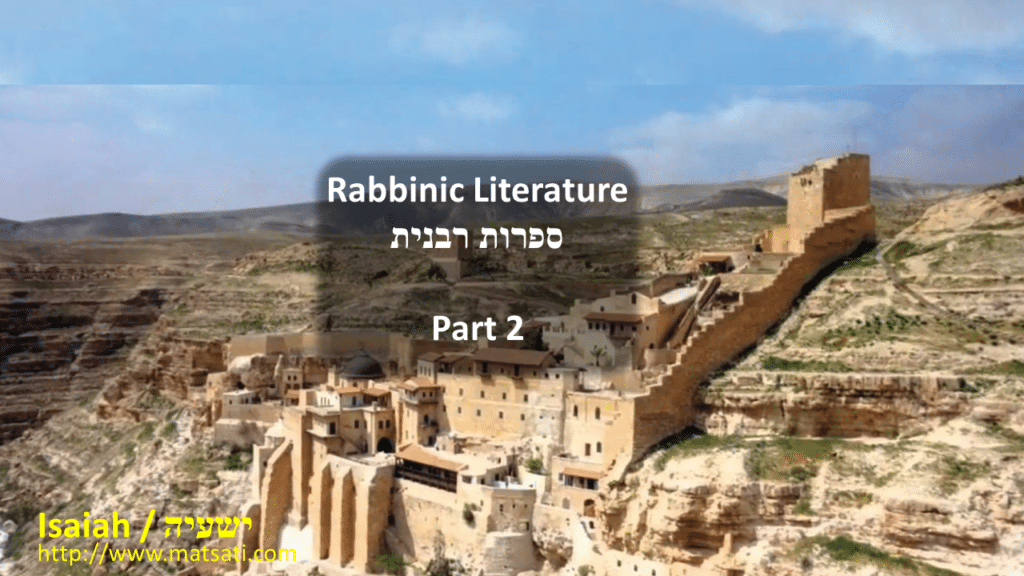
The Targum Jonathan interprets Isaiah’s words in the following way:
תרגום יונתן בן עוזיאל אל ישעיה פרק ג:יד-כו
יד יוי בְדִינָא יֵיעֹול עִם סָבֵי עַמֵיה וְרַברְבֹוהִי וְאַתוּן אְנַסתוּן יָת עַמִי חְטֹוף מִסכֵינַיָא בְבָתֵיכֹון׃ טו מָא לְכֹון דְאַתוּן מְמַסכְנִין יָת עַמִי וְאַפֵי חַשִיכַיָא מֹובְלִין אַתוּן וּמֵיתַן בְדִינְהֹון אְמַר יוי אְלֹהִים צְבָאֹות׃ טז וַאְמַר יוי חְלָף דְאִתרָרַבָא בְנָת צִיֹון אָזְלָן מְרִימָן צַוָאר וּמסַרבְקָן עַינִין אָזְלָן וּבפָוָתְהֹון מַקְפָן וּברַגלֵיהֹון מַרגְזָן׃ יז וִישַעבֵיד יוי יַקִירַת בְנָת צִיֹון וַיוי יְקָרְהֹון יַעדֵי׃ יח בְעִידָנָא הַהוּא יַעדֵי יוי יָת תוּשבְחָת מְסָנַיָא וּשבִיסַיָא וְסִבכַיָא׃ יט עִנקַיָא וְשֵירֵי יְדַיָא וַחְנִסנְסַיָא׃ כ כְלִילַיָא וְשֵירֵי רַגלַיָא וקוּלמַזמְסַיָא וּקֳדָשַיָא וַחְלִיטָתָא׃ כא עִזקָתָא וְטִלטוּלַיָא׃ כב כִיתוּנַיָא וְשֹושִיפַיָא וּלבֹורנְקַיָא וּמַחְכַיָא׃ כג וְמַחזְיָתָא וְקַרטֵיסַיָא וְכִתרַיָא וּכבֵינָתָא׃ כד וִיהֵי אְתַר דַהְוַאָה יַהְבָן בוּסמִין יִתמְסֵי וַאְתַר דַהְוַאָה אָסְרָן פְסִיקַיָא יְהֵי רוּשמִין דְמַחָא וּחלָף אַקָפוּת פָתָא גִיזוּז רֵיש וּחלָף דַהְוַאָה מְהַלְכָן בְגֵיוָה יֵיסְרוּן סַקִין דָא פֹורעָנוּתָא תִתעְבֵיד מִנְהֹון אְרֵי טְעַאָה בְשֻפרְהֹון׃ כה שְפַר גִיבָרַך בְחַרבָא יִתקַטלוּן וְעָבְדֵי נִצחָנַך בִקרָבָא׃ כו וִיצַדֹון וִיסוּפוּן תַרעֵי קִרוַהָא וְתִתרֹוקַן אַרעַה וְתִחרוּב׃
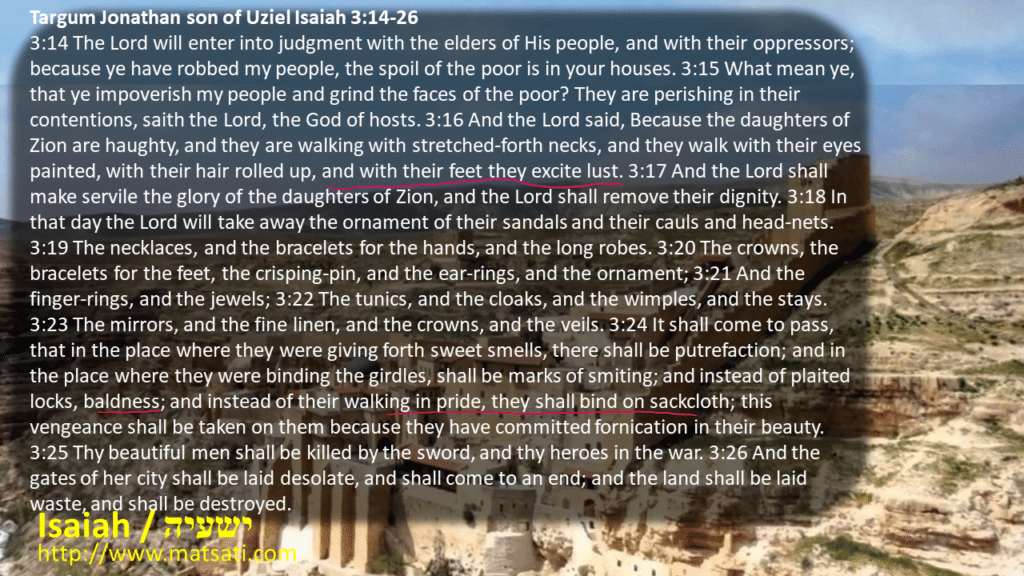
Targum Jonathan son of Uziel Isaiah 3:14-26
3:14 The Lord will enter into judgment with the elders of His people, and with their oppressors; because ye have robbed my people, the spoil of the poor is in your houses. 3:15 What mean ye, that ye impoverish my people and grind the faces of the poor? They are perishing in their contentions, saith the Lord, the God of hosts. 3:16 And the Lord said, Because the daughters of Zion are haughty, and they are walking with stretched-forth necks, and they walk with their eyes painted, with their hair rolled up, and with their feet they excite lust. 3:17 And the Lord shall make servile the glory of the daughters of Zion, and the Lord shall remove their dignity. 3:18 In that day the Lord will take away the ornament of their sandals and their cauls and head-nets. 3:19 The necklaces, and the bracelets for the hands, and the long robes. 3:20 The crowns, the bracelets for the feet, the crisping-pin, and the ear-rings, and the ornament; 3:21 And the finger-rings, and the jewels; 3:22 The tunics, and the cloaks, and the wimples, and the stays. 3:23 The mirrors, and the fine linen, and the crowns, and the veils. 3:24 It shall come to pass, that in the place where they were giving forth sweet smells, there shall be putrefaction; and in the place where they were binding the girdles, shall be marks of smiting; and instead of plaited locks, baldness; and instead of their walking in pride, they shall bind on sackcloth; this vengeance shall be taken on them because they have committed fornication in their beauty. 3:25 Thy beautiful men shall be killed by the sword, and thy heroes in the war. 3:26 And the gates of her city shall be laid desolate, and shall come to an end; and the land shall be laid waste, and shall be destroyed.
In Targum Jonathan, it is obvious the prophet Isaiah has continued his discussion by describing the pride of women. Their sins lead to causing men to lust as it says according to Isaiah 3:16, טז וַאְמַר יוי חְלָף דְאִתרָרַבָא בְנָת צִיֹון אָזְלָן מְרִימָן צַוָאר וּמסַרבְקָן עַינִין אָזְלָן וּבפָוָתְהֹון מַקְפָן וּברַגלֵיהֹון מַרגְזָן׃ 3:16 And the Lord said, Because the daughters of Zion are haughty, and they are walking with stretched-forth necks, and they walk with their eyes painted, with their hair rolled up, and with their feet they excite lust. (TgJ) What Isaiah is talking about here is how women are to dress modestly so as not to cause men to lust. The reason for dressing with modesty is for the purpose of being responsible such that one isn’t reduced to objectification. Women are not objects, rather they are very valuable in God’s eyes and therefore should dress in a way that brings honor. Something to note concerning the issue of modesty, when a man lusts due to a woman’s immodestly dressing, this does not mean he isn’t a godly man. The idea that all men who lust are perverts and good men never lust is false. When a woman is immodestly dressed, a man by nature, his mind will wander leading to impure thoughts. This is why Job said “I made a covenant with my eyes not to look lustfully at a young woman.” (Job 31:1) These things reveal to us that the responsibility is on both men and women. The conclusion is women have the responsibility to dress modestly, and men have the responsibility to not make the lingering look which may lead to lust in the heart.
The Targum on Isaiah 3:14 states the following, יד יוי בְדִינָא יֵיעֹול עִם סָבֵי עַמֵיה וְרַברְבֹוהִי וְאַתוּן אְנַסתוּן יָת עַמִי חְטֹוף מִסכֵינַיָא בְבָתֵיכֹון׃ 3:14 The Lord will enter into judgment with the elders of His people, and with their oppressors; because ye have robbed my people, the spoil of the poor is in your houses. (TgJ) The rabbis in the Talmud speak of this verse in the following way:
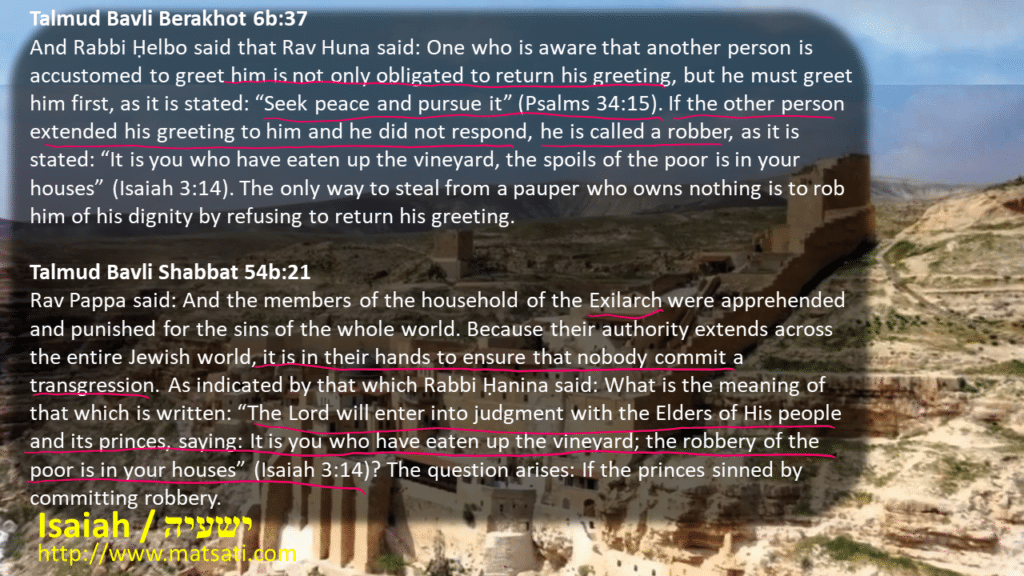
Talmud Bavli Berakhot 6b:37
And Rabbi Ḥelbo said that Rav Huna said: One who is aware that another person is accustomed to greet him is not only obligated to return his greeting, but he must greet him first, as it is stated: “Seek peace and pursue it” (Psalms 34:15). If the other person extended his greeting to him and he did not respond, he is called a robber, as it is stated: “It is you who have eaten up the vineyard, the spoils of the poor is in your houses” (Isaiah 3:14). The only way to steal from a pauper who owns nothing is to rob him of his dignity by refusing to return his greeting.
Have you ever had this kind of experience, where you say hello to someone and they look right at you and do not make any expression on their face, just walk by as if you don’t exist and did not say hello? The Talmud describes these sorts of people as thieves, as robbers, who intentionally walk in their pride as oppressors. In my professional life, it is surprising how many men behave like this today. The rabbis say this is related to what is known as human dignity, that when a person is treated like this he is being robbed of his dignity. Human dignity is related to human rights. Human rights violations rob people of their dignity. One of the most fundamental rights that are derived from the scriptures is the right to personal freedom, liberty, and justice. These things describe the right to life, liberty, and dignity all of which are not possible outside of faith and a relationship with the Lord God Almighty in heaven. Isaiah says “The Lord will enter into judgment with the elders of His people” explaining how when leadership becomes evil the people are robbed of their dignity. The rabbis in the Talmud continue saying the following :
Talmud Bavli Shabbat 54b:21
Rav Pappa said: And the members of the household of the Exilarch were apprehended and punished for the sins of the whole world. Because their authority extends across the entire Jewish world, it is in their hands to ensure that nobody commit a transgression. As indicated by that which Rabbi Ḥanina said: What is the meaning of that which is written: “The Lord will enter into judgment with the Elders of His people and its princes, saying: It is you who have eaten up the vineyard; the robbery of the poor is in your houses” (Isaiah 3:14)? The question arises: If the princes sinned by committing robbery,
“The Talmud mentions the members of the household of the Exilarch as being punished for the sins of the world. The Exilarch was the leader of the Jewish community in Persian Mesopotamia (modern day Iraq) during the era of the Parthians, Sassanids and Abbasid Caliphate up until the Mongol invasion of Baghdad in 1258, with intermittent gaps due to ongoing political developments. The Exilarch was universally regarded by the Jewish community as the royal heir of the House of David and held a place of prominence as both a rabbinical authority and as a noble within the Persian court. The Greek word exilarch is a an expression adopted from the Hebrew Rosh Galut (ראש גלות), literally meaning ‘head of the exile’. The Jewish people in exile were referred to as golah (Jeremiah 28:6, 29:1) or galut (Jeremiah 29:22). The contemporary Greek term that was used was Aechmalotarches (Αἰχμαλωτάρχης), literally meaning the ‘leader of the captives’.” (cited from: Saperstein, M. (2013). POSITIONS OF JEWISH LEADERSHIP: SOURCES OF AUTHORITY AND POWER. European Judaism: A Journal for the New Europe, 46(1), 50-59. Retrieved August 11, 2021, from http://www.jstor.org/stable/42751117) The idea here is that there is a leader who is punished for the sins of the world according to the Talmud. The one who is the “leader of the captives” provides us with overtures of messianic expectation. The Messiah was a figure described in the Tanakh (OT), which is full of scripture that refers to the promise of a savior who would come from the line of David and redeem people from captivity to sin and brokenness. This is the role of a good leader as opposed to the kind of leadership being described by Isaiah, טו מָא לְכֹון דְאַתוּן מְמַסכְנִין יָת עַמִי וְאַפֵי חַשִיכַיָא מֹובְלִין אַתוּן וּמֵיתַן בְדִינְהֹון אְמַר יוי אְלֹהִים צְבָאֹות׃ 3:15 What mean ye, that ye impoverish my people and grind the faces of the poor? They are perishing in their contentions, saith the Lord, the God of hosts. (TgJ)
Isaiah continues according to TgJ saying, טז וַאְמַר יוי חְלָף דְאִתרָרַבָא בְנָת צִיֹון אָזְלָן מְרִימָן צַוָאר וּמסַרבְקָן עַינִין אָזְלָן וּבפָוָתְהֹון מַקְפָן וּברַגלֵיהֹון מַרגְזָן׃ 3:16 And the Lord said, Because the daughters of Zion are haughty, and they are walking with stretched-forth necks, and they walk with their eyes painted, with their hair rolled up, and with their feet they excite lust. (TgJ) The outcome of a sinful lifestyle always leads to immodesty. Consider the LGBTQ community and how immodesty is taken to its extreme which is coupled to sexual sin. The rabbis of the Talmud go on to say the following:
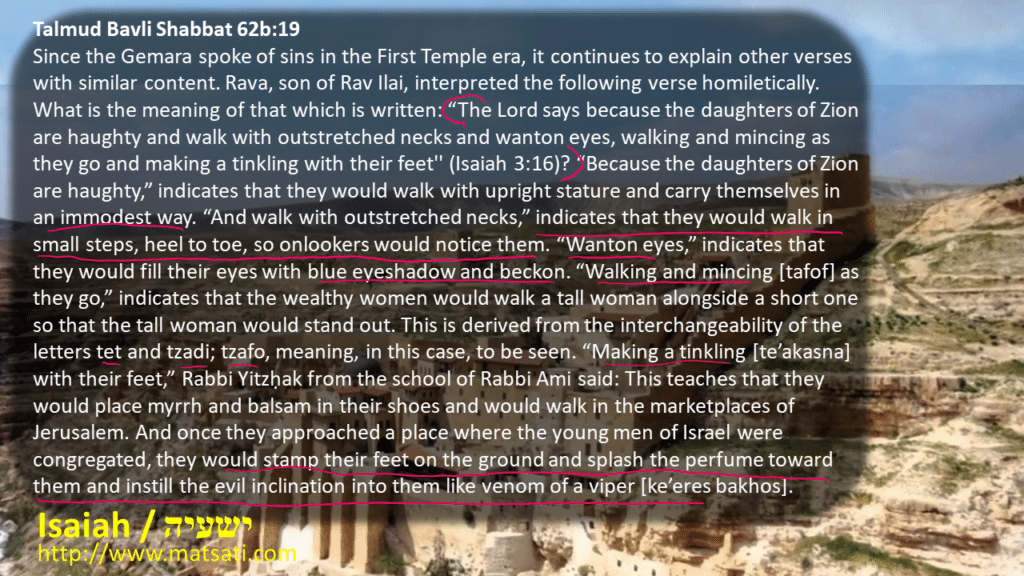
Talmud Bavli Shabbat 62b:19
Since the Gemara spoke of sins in the First Temple era, it continues to explain other verses with similar content. Rava, son of Rav Ilai, interpreted the following verse homiletically. What is the meaning of that which is written: “The Lord says because the daughters of Zion are haughty and walk with outstretched necks and wanton eyes, walking and mincing as they go and making a tinkling with their feet” (Isaiah 3:16)? “Because the daughters of Zion are haughty,” indicates that they would walk with upright stature and carry themselves in an immodest way. “And walk with outstretched necks,” indicates that they would walk in small steps, heel to toe, so onlookers would notice them. “Wanton eyes,” indicates that they would fill their eyes with blue eyeshadow and beckon. “Walking and mincing [tafof] as they go,” indicates that the wealthy women would walk a tall woman alongside a short one so that the tall woman would stand out. This is derived from the interchangeability of the letters tet and tzadi; tzafo, meaning, in this case, to be seen. “Making a tinkling [te’akasna] with their feet,” Rabbi Yitzḥak from the school of Rabbi Ami said: This teaches that they would place myrrh and balsam in their shoes and would walk in the marketplaces of Jerusalem. And once they approached a place where the young men of Israel were congregated, they would stamp their feet on the ground and splash the perfume toward them and instill the evil inclination into them like venom of a viper [ke’eres bakhos].
The rabbis in the Talmud summarize what Isaiah is saying here. The Talmud Bavli Sotah 47b:22 speaks of these verses as referring to adultery and Yoma 9b:6 says that these women are seeking forbidden sexual relations. King Solomon wrote, צְדָקָ֥ה תְרֽוֹמֵֽם־גּ֑וֹי וְחֶ֖סֶד לְאֻמִּ֣ים חַטָּֽאת׃ “Righteousness exalts a nation, but sin condemns any people.” (Mishley / Proverbs 14:34) The idea here is חֶ֖סֶד לְאֻמִּ֣ים חַטָּֽאת “destruction is to a people who sin.” This is how the nation of Israel was behaving in the First Temple Period. We see something very similar in today’s society, with a nation that seeks sexual sin and promotes sexual sin such that it is generally accepted as normal. When these things happen, we know according to the Scriptures that a nation is about to be destroyed. Such a nation is full of depravity, delusion, and has turned from the ways of God. When Governments usurp the authority of God, this is what was happening in Isaiah’s time with the leaders rejecting the God of Israel. We are told that the Lord God Almighty will lift his protecting hand from the nation, allowing their enemies to overcome them. This then leads to unrestrained moral decay, leading to the destruction of the family, and schools become godless indoctrination centers as opposed to a source of truth for our children. Truth isn’t taught because the leaders of the educational system do not believe or trust in the God of Israel and Yeshua the Messiah, as a result there is a difficulty in discerning between right and wrong. Society today has become selfish-absorbed, selfish, “it’s all about me” mentality, proud, arrogant, and morally decayed, where these things are accepted as normal. According to Paul these things are part of God’s judgment in Romans 1:21-23.
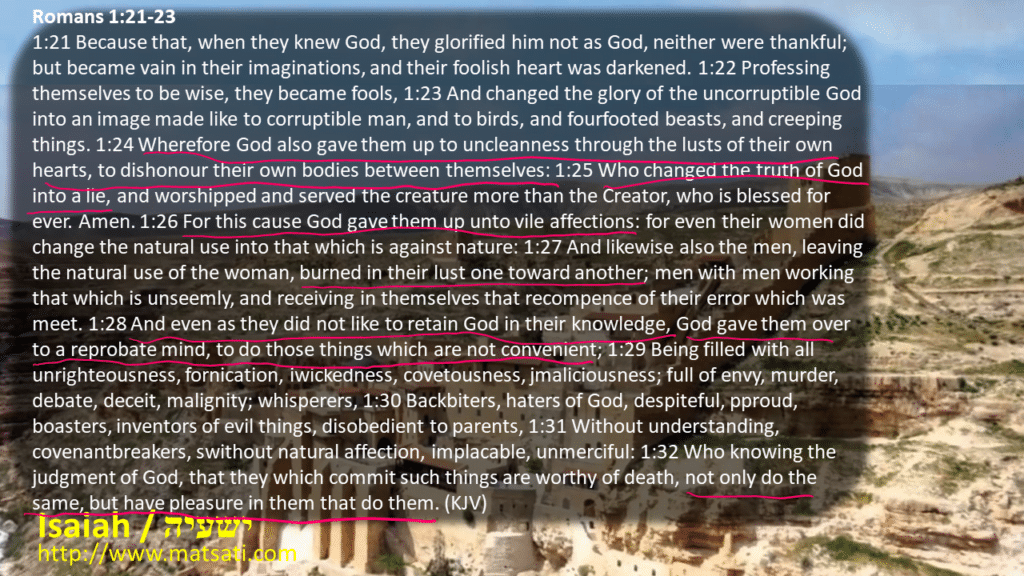
Romans 1:21-23
1:21 Because that, when they knew God, they glorified him not as God, neither were thankful; but became vain in their imaginations, and their foolish heart was darkened. 1:22 Professing themselves to be wise, they became fools, 1:23 And changed the glory of the uncorruptible God into an image made like to corruptible man, and to birds, and fourfooted beasts, and creeping things. 1:24 Wherefore God also gave them up to uncleanness through the lusts of their own hearts, to dishonour their own bodies between themselves: 1:25 Who changed the truth of God into a lie, and worshipped and served the creature more than the Creator, who is blessed for ever. Amen. 1:26 For this cause God gave them up unto vile affections: for even their women did change the natural use into that which is against nature: 1:27 And likewise also the men, leaving the natural use of the woman, burned in their lust one toward another; men with men working that which is unseemly, and receiving in themselves that recompence of their error which was meet. 1:28 And even as they did not like to retain God in their knowledge, God gave them over to a reprobate mind, to do those things which are not convenient; 1:29 Being filled with all unrighteousness, fornication, iwickedness, covetousness, jmaliciousness; full of envy, murder, debate, deceit, malignity; whisperers, 1:30 Backbiters, haters of God, despiteful, pproud, boasters, inventors of evil things, disobedient to parents, 1:31 Without understanding, covenantbreakers, swithout natural affection, implacable, unmerciful: 1:32 Who knowing the judgment of God, that they which commit such things are worthy of death, not only do the same, but have pleasure in them that do them. (KJV)
We note how Paul describes a people, a nation, or individuals who reject God that something else will take its place. This draws on the idea of idolatry, saying that such people will worship created things, even to build one’s own graven image. Paul says this leads to the degrading of their bodies, those who do such things. Those who have forgotten all that God had done for them are ungrateful. Paul continues to explain what these things lead to, “God gave them over to shameful lusts. Even their women exchanged natural relations for unnatural ones. Men committed indecent acts with other men, and received in themselves the due penalty for their perversion.” (Romans 1: 26-27) The idea of giving over is giving someone what they want, what they desire. This is why our nation and nations around the world have fallen into depravity. When a nation or an individual chooses to not seek the God of Israel, Paul interprets this as “He gave them over to a depraved mind, to do what ought not to be done.” (Romans 1:28) This draws back the idea of pride that Isaiah is speaking about. When one thinks he or she is so wise, he or she begins falling for delusions and lies, either conjured up by one’s own futile thinking, or being deceived by the evil one to not believe the truth. The final outcome is that “They are filled with every kind of wickedness, evil, greed and depravity. They are full of envy, murder, strife, deceit and malice. They are gossips, slanderers, God-haters, insolent, arrogant and boastful; they invent ways of doing evil; they disobey their parents; they are senseless, faithless, heartless, ruthless.” (Romans 1:28-32) Like the women being described in Isaiah 3, these people are proud to flaunt their sexual promiscuity and immoral lifestyles. We note what governments around the world are doing, they “approve of those who practice them” (Romans 1:32) the KJV states they “have pleasure in them that do them.” Paul was led by God to warn the Romans, just as Isaiah was called to warn Jerusalem and Judah, about the danger of rejecting the Lord. As God’s people we are called to openly speak about our faith and the joy of our salvation, the wonders of God and His work in our lives, and the power of God to help us to overcome this world as Yeshua overcame the world! When these truths are rejected, a society will be reduced to a moral cesspool and somehow the people of that society will believe these things are normal. Consider a proof text by simply looking at what is going on today in cultures around the world! The pillars of society are those of the leaders of the people. When the leaders are corrupted, the people also fall into corruption and depravity. This is the process of being utterly destroyed, as Isaiah is warning. This is why Isaiah said according to Isaiah 3:26, כו וִיצַדֹון וִיסוּפוּן תַרעֵי קִרוַהָא וְתִתרֹוקַן אַרעַה וְתִחרוּב׃ 3:26 And the gates of her city shall be laid desolate, and shall come to an end; and the land shall be laid waste, and shall be destroyed. (TgJ) The days of a nation that rejects God are numbered! Note how the Torah speaks about these things, and reveals to us who God is, as always responding the same way from generation to generation, that if we seek the Lord God Almighty, to honor Him, to make His words a part of our lives, to believe in the Messiah, the Anointed one of God, He will bless us and guide us! Note how for forty years Israel was fed, clothed, and instructed by God. Repentance and returning is the call of God to His people back during Isaiah’s time. It is also our calling before God today! Repentance and returning to God are our only hope. This means true repentance and sorrow over our actions, not just being sorry for getting caught. We must confess our sins and turn from our sin! This is only possible with the Help of God and the presence of God in our lives through faith in Yeshua the Messiah!
